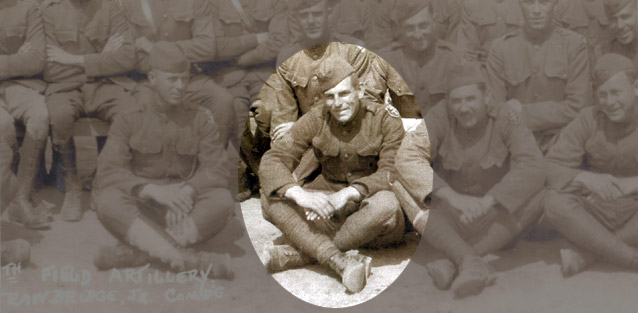 My father, Sgt. Alvin L. Leisey, Sr., was a member of the U.S. Army 79th Division, 310th
Field Artillery Regiment in World War I. He fought in the Belleau Wood, St. Mihiel, Meuse-Argonne Forrest
Offensives. Dad never shared his war experiences with me, so the following information is from discussions
with my oldest brother, Alvin L. Leisey, Jr. and extensive reading about WW I.
My father, Sgt. Alvin L. Leisey, Sr., was a member of the U.S. Army 79th Division, 310th
Field Artillery Regiment in World War I. He fought in the Belleau Wood, St. Mihiel, Meuse-Argonne Forrest
Offensives. Dad never shared his war experiences with me, so the following information is from discussions
with my oldest brother, Alvin L. Leisey, Jr. and extensive reading about WW I.
According to Norman Stone, author of World War One, "WW I was the overwhelming disaster from which everything else in the twentieth century stemmed." WW I initially was known as the "European War," "the Great War for Civilization" and later as the "War to END ALL WARS." The four-year conflict was between the Allies (Great Britain, France, Russia, Italy, Portugal, certain Latin American nations, China, Greece, and from 1917, the United States) and Central Powers (Germany, Austria-Hungary, Turkey and Bulgaria). In 1914, the world was ruled by empires: British, German, Austro-Hungarian (Habsburg), and Turkey (Ottoman). Military alliances and secret pledges tied the empires together as a coalition war. At the same time, the world was changing and tensions were rising due to industrialization, and growing nationalism among ethnic minorities. World War I lasted for four years and caused the deaths of millions of combatants and laid waste to much of Europe. It was one of the most devastating wars in the history of the world.
WW I began with the assassination of Archduke Francis Ferdinand, heir apparent to the Emperor of Austria-Hungary, by a Bosnian Serb on June 28, 1914, in Sarajevo, Bosnia-Herzegovina. The United States did not enter the war until 1917, because President Woodrow Wilson did not want our country involved in the war. In fact, in 1916, Wilson ran and won a second term as President of the United States on the platform that he kept America out of the war and declared that he would not submit any American troops to the war.
American neutrality was threatened on May 7, 1915, when the British passenger ship, Lusitania enroute from New York to Liverpool, England was sunk by a German U-boat off the coast of southern Ireland, near Old Head, near the town of Kinsale, killing 1,198 passengers and crew, including 124 Americans. By 1917, unrestricted German submarine warfare caused the United States to enter the war on the side of the Allies.
President Woodrow Wilson declared war on Germany on April 6, 1917. Thousands of American volunteers answered the call of duty, and the armed forces underwent rapid expansion. An American Expeditionary Force, commanded by General "Black Jack" Pershing, landed in France and saw its first action in June 1917.
According to John Keegan, in the Illustrated History of The First World War, "At the beginning of 1917, four months before the United States entered the war on the side of the Allies, its army might indeed have meant nothing. It ranked seventeenth in size in the world. It had no experience of large-scale operation since the armistice at Appomattox fifty-two years earlier, and possessed no modern equipment heavier than its medium machine guns."
Dad enlisted and was inducted into the US Army at Oxford, Pennsylvania on November 1, 1917, when he was 20 years old. He proceeded to Camp Meade, now Fort Meade, Maryland where he joined a unit made up primarily of Maryland men. He became a "Doughboy," a term given to the American soldier. During the hectic days of the fall of 1917, Camp Meade was the site of thousands of young soldiers being trained and prepared to fight in Europe in WW I.
Dad's division sailed for Brest, France from New York City in July 1918. In only nine months of service, Dad was promoted from Private to Corporal to Sergeant. He was promoted to Corporal on May 27, 1918, and received a battlefield promotion to Sergeant in LaCourtine, France on July 9, 1918. He was assigned to the 310th Field Artillery Unit because, as a farmer, he was accustomed to managing teams of mules and horses. As Sergeant, he was given the job of managing the mules that were used to pull the cannons. Even though Dad only went to the eighth grade in school, and did not have the opportunity to take courses in advanced mathematics, he was able to calculate the coordinates in firing the cannons.
Like many veterans of the war, Dad was gassed with mustard gas, a new weapon of mass destruction used by the Germans during the war. According to the book, Eleventh Hour, Eleventh Day, Eleventh Month: ARMISTICE DAY, 1918, by Joseph E. Persico, "Mustard gas burned and blistered any exposed part of the body and swelled the eyelids, causing temporary or permanent blindness. Mustard gas was stubborn, clinging to the ground as long as three days. Heavier than air, it settled into craters and trenches where men had taken refuge." It also caused blindness, deafness, loss of voice, inability to swallow, choking, difficulty breathing, and burns.
On numerous occasions as a youth, I remember going through the green trunk that Dad brought home from the war that was stored in the basement of our house. The trunk contained Dad's uniform, gas mask, enlistment and promotion papers, and numerous other items from the war. I remember smelling the woolen uniform and putting on the gas mask never realizing the severity of the battles that Dad had gone through.
The Battle of Meuse-Argonne
According his book, 11th MONTH, 11TH DAY, 11TH HOUR: ARMISTICE DAY, 1918, Joseph E. Persico, best describes the military conflicts that Dad and his Division were involved in during the latter stages of the war:
"…The strategy for breaking the southern end of the Hindenburg Line in the Meuse-Argonne was launched on September 26, 1918…The German Army's lifeline in France was a skein of railroads running behind and roughly parallel to the front. These lines converged near the city of Sedan, some thirty-four miles in front of the Americans…The Germans, well aware that they faced a defend-or-die situation hardened the Meuse-Argonne sector of the Hindenburgh Line with seven ribs of trenches, bunkers, and antitank ditches. To smash through this cordon, the United States had marshaled the largest force in the history of American arms, one that would eventually reach one million doughboys mobilized along the Meuse-Argonne front.
'The respite between the American victory at Saint-Mihiel and this latest offensive was a brief ten days. In the interim, men were marched or trucked to forward positions, huge ammunitions dumps were stacked up by black service troops, rations were heaped in unappetizing piles, and the doughboys groused. While death waited in the offing, their immediate distress had more banal roots: bodies unwashed, and plagued by lice, food contaminated, the air fouled by the dead, a smell that clung to army wool.
'At 5:30 A.M. …the U.S. Army, flanked on the right and left by French troops, began to move northward from a point seven miles northeast of Verdun. Artillery had been firing for the previous two and a half hours, 390 guns crammed two hundred to the mile along a twenty-five mile front. To one granted the perspective of distance, the scale of it all, the masses of men, the blinding light bursting from flares and cannon mouths, the ear-numbing cacophony presented a magnificent spectacle. Yet the universe of the man on the ground was tightly circumscribed, limited to the men to his left and those to his right. As the soldiers prepared to abandon the protection of their lines, a man's future could be measured not necessarily in years, months, or even days but in minutes, even seconds.
'Troops of the 79th Division were arrayed before Montfaucon, a hill dominating the center of the front. Its earth was steeped in ancient blood. More than a thousand years before, men had died on its slopes in battles between warring tribes. Rain appeared to be the inevitable concomitant of a new offensive on the western front, including this day. Numerous creeks crisscrossing the region flooded and turned fields into quagmires. Troops dumped tens of thousands of sandbags into washed-out roadbeds to allow supply wagons to reach the front. The infantrymen had to lay down duckboards to advance.
'The Germans had by now developed gas warfare to a wicked art. In the Argonne, they would begin blanketing a sector with gas at night. The Americans would put on their masks until the vapors settled into the ground and, when the danger appeared to be over, take them off. But when the sun rose the following morning, the earth would warm and the gas would rise again, poisoning the unprotected doughboys.
'After a week of fighting in the Meuse-Argonne, the Americans had penetrated seven miles into German territory, every inch of which the enemy yielded grudgingly. Behind the American lines, chaos reigned. Monumental traffic jams choked the roads, stalling ambulances and leaving the wounded to wait on bare ground. Stragglers, honestly lost or shirking, wandered about in undisciplined packs.
'On October 6, an emotionally drained German General Ludendorff went to the quarters of his nominal supervisor, Field Marshall von Hindenburg, and said that the Americans had struck at the army's vitals, morale was crumbling, and the man power bottom had been scraped. There was no choice; they must seek an amistice."
The Treaty of Versailles and the other treaties that ended World War I on November 11, 1918, changed the face of Europe and the Middle East and changed the world powers. Four great empires - Germany, (Habsburg) Austria-Hungary, Russia and the Ottoman (Turkey) - had disappeared by the end of the war. The Germany that signed the armistice was now a republic, no longer an empire. Throughout the war, a total of 65 million men and women had served in the armies and navies; an estimated 10 million persons had been killed and double that number wounded.
According to Joseph Persico, in describing one witness' account of the arrival of peace at 11:00 AM on November 11, 1918, "A curious rippling sound gradually rises, the sound of men beginning to cheer the Vosges to the sea. The bloody war's over! No more slaughter, no more maiming, no more mud and blood, and no more killing and disemboweling of horses and mules. No more of those hopeless dawns with the rain chilling the spirits, no more crouching in inadequate dugouts scooped out of trench walls, no more dodging of snipers' bullets, no more of that terrible shell-fire. No more shoveling up bits of men's bodies and dumping them into sandbags; no more cries of 'Stretcher-bear-ER!,' and no more of those beastly gas masks and odious smell of pear drops which was deadly to the lungs, and no more writing of those dreadfully difficult letters to the next-of-kin of the dead."
Harry Patch, III, who died at the age of 111 on July 25, 2009, was the last known survivor of World War I. He was quoted in his Obituary in the New York Times as remembering the war as "mud, mud, and more mud mixed together with blood. Anyone who tells you that in the trenches they weren't scared, he's a damned liar: You were scared all the time!"
Hew Strachan concluded in his book The First World War, "The First World War broke the empires of Germany, Russia, Austria-Hungary and Turkey. It triggered the Russian Revolution and provided the bedrock for the Soviet Union; it forced a reluctant United States on to the world stage and revivified liberalism. On Europe's edge, it provided a temporary but not a long-term solution to the ambitions of the Balkan nations. Outside Europe it laid the seeds for the conflict in the Middle East. In short it shaped not just Europe but the world in the twentieth century. It was emphatically not a war without purpose." It's interesting that some of the participants in WW I went on to become prominent in World War Two, namely: Adoph Hitler, Harry Truman, Winston Churchill, Douglas MacArthur, Dwight Eisenhower, George Patton, and others.
According to my brother, Alvin L. Leisey, Jr., "After the Armistice on November 11, 1918, ending the war, Dad along with other soldiers visited Monte Carlo and marched in the "Victory Parade" through the Arch of Triumph in Paris, France prior to returning home with his division. Many of the soldiers in Dad's division, came home with physical and/or mental scars of the war." 4,734,991 Americans served in World War I, there were 116,516 U.S. military deaths, and 204,002 U.S. military wounded.
Unfortunately, our government did not take very good care of the Veterans from World War I. In 1924, the veterans campaigned Congress and were promised a special "Bonus" for their service to be paid in twenty-one years (1945). In the midst of the Great Depression, the Veterans asked for an early payment of the reward. President Herbert Hoover denied their request. So in May 1932, 15,000 Veterans protested by setting up tents, leantos, and packing crates as shelter on the grounds near the White House in Washington, D.C. These great Americans were accused of being "Bolsheviks" and "un-American" because of their protests.
President Hoover wanted order among the rowdy veterans and sent General Douglas MacArthur, Chief of Staff and a WWI hero, to crush the "Bonus Marchers," with cavalry, infantry, and six tanks to restore order. The military used bayonets, tear gas and fired on the ragged band of protesters to disperse their camp.
Dad received an Honorable Discharge on June 2, 1919. He received a small "Bonus" for his service in WW I, but was bitter throughout his life because of how the government mistreated the veterans of WW I.
Bibliography
DeGregorio, William A., The Complete Book of U.S. Presidents. New York: Barnes and Noble
Publishing, Inc., 2002.
Folsom, Jr., Burton, New Deal or Raw Deal? New York: Threshol Editions, 2008.
Howard, Michael, The First World War. New York: Oxford Universtiy Press, 2002.
Keegan, John, An Illustrated History of The First World War. New York: Alfred A. Knopf,
2001.
Persico, Joseph E., Eleventh Month, Eleventh Day, Eleventh Hour. New York: Random House,
2004.
Stone, Norman, World War One. New York: Basic Book, 2009.
Strachan, Hew, The First World War. New York: Penquin Group, 2003.
Willmott, H.P., World War I. New York: Dorling Kindersley Publishing, Co..2006.
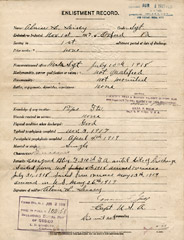 Alvin Leisey's Army Enlistment Record, 1918 |
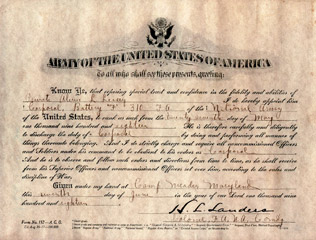 Alvin Leisey Promoted to Corporal, May 1918 |
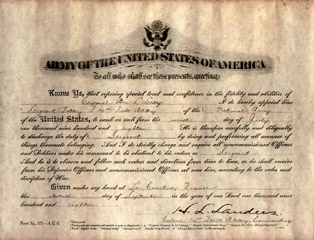 Alvin Leisey promoted to Sergeant, July 1918 |
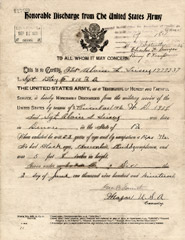 Alvin Leisey's Honorable Discharge, June 1919 |
